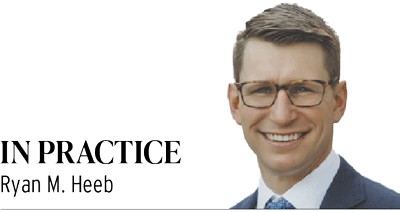Subscriber Benefit
As a subscriber you can listen to articles at work, in the car, or while you work out. Subscribe Now Most, if not all, of our professional lives as lawyers are devoted to serving others. Add on top of that the myriad other obligations we all have (family, social, philanthropic, etc.) and we quickly run out of hours in the day to accomplish all we need and want to do.
Most, if not all, of our professional lives as lawyers are devoted to serving others. Add on top of that the myriad other obligations we all have (family, social, philanthropic, etc.) and we quickly run out of hours in the day to accomplish all we need and want to do.
While the consequences of this reality may be that an email goes unanswered, an extension of time becomes necessary, or an invitation must be declined, perhaps far too often the consequence is that we have put ourselves and our health last.
Restless nights, endless hours of sitting, and consumption of less than nutritious foods and drinks are all a recipe for a decline in our mental and physical health. These declines can pose a risk to our professional lives as it decreases our ability to focus, manage stress, and could ultimately lead to an increase in the number of doctor appointments.
As lawyers, we rely heavily on our cognitive health. In order to best serve our clients, we should consider how our daily habits either boost or impair our health and ability to meet our obligations. What follows are a few ideas on how to develop some habits that may help to boost your mental and physical health.
Move!
Research indicates that a stationary lifestyle can lead to a variety of health complications later in life. Unfortunately, all of us spend many hours a day sitting at a desk.
To combat this, I try to work out most mornings before going to the office. I have found that 30-45 minutes of cardio or weightlifting does wonders for my mental and physical state. When my schedule does not allow for a morning workout, I carve out time during the day to walk or stretch.
I suggest that we all unabashedly make time for ourselves by taking breaks and doing some type of physical movement. It can be as simple as doing some stretches at your desk or taking a brief walk around your office. Anything which gets you away from your computer or phone even for a short while can help improve circulation and mental acuity and help reduce stress.
Eat this, not that
I recently read an article by Alice Callahan in the New York Times about ultraprocessed foods (UPFs), which are foods made with ingredients not found in a store. The article discussed the industrial methods used to process such foods and the dangers to our health these foods pose.
Studies have linked UPFs to heart disease-related deaths, Type 2 diabetes and mental health illnesses such as anxiety and depression. Unfortunately, UPFs in the form of fast food and snack food are cheap, accessible and easy to acquire.
Those attributes are perhaps why we reach for the cookie or chip during the long mediation rather than the carrot stick. I myself try but fail on occasion to consume nutrient-dense foods and avoid UPFs. If you know your day will be packed with hearings or meetings, grab an energy or protein bar made with unprocessed ingredients to provide more energy throughout the day than the packaged snack found in your office break room.
Hydration is the key to success
My brother, ever the outdoorsman, is fond of this saying, “Our bodies and brains need water.” I have discovered that when I am less hydrated, I feel “foggy.” A bottle of water or some electrolytes seem to clear this fog from my mind.
The key is to make sure you are hydrating consistently. The easiest way to do that is by keeping a large bottle with water or electrolytes close by. That serves not only as a reminder to hydrate but also makes it easy to hydrate. I also suggest ditching the sodas and opting for sparkling water (but perhaps this is just my inner-millennial speaking).
These suggestions are by no means earth-shattering or guaranteed to work for everyone. They are simply a few things that have helped me over the last few years. The important point is that we all should carefully consider the food and drink we consume and how we spend our time. Making small changes that are designed to boost health overall is bound to yield results not just for us personally but also professionally.
We owe it to ourselves, partners and clients to maintain good physical and mental health so that we can continue to fulfill our obligations. We have to remember that we owe a duty to ourselves to maintain our health.•
__________
Ryan M. Heeb is a partner in the Bloomington firm of Bunger & Robertson. The opinions expressed in this article are those of the author.
Please enable JavaScript to view this content.
